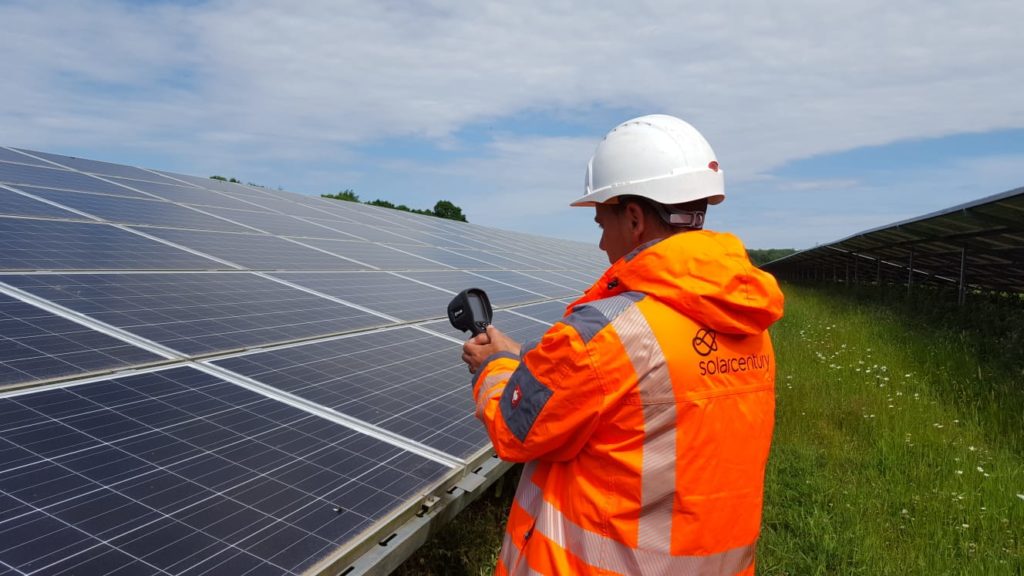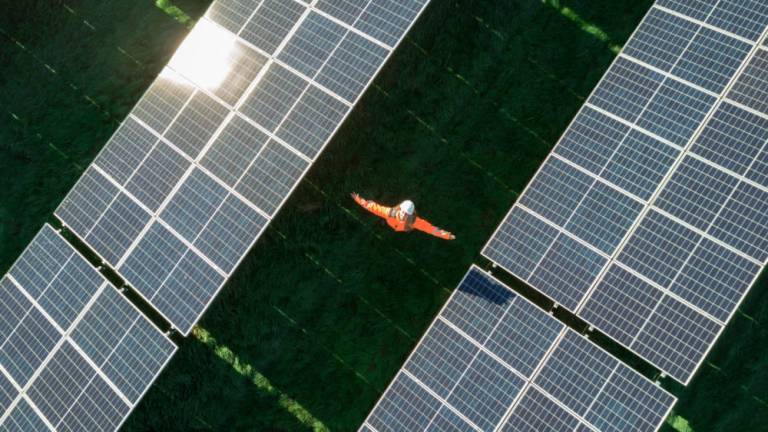UK significantly underestimating role of solar on path to net zero

UK significantly underestimating role of solar on path to net zero
London, 13 June 2019: New research reveals that over the next decade, solar can provide at least 20% of the UK’s electricity and create 200,000 jobs in the country – more than double current forecasts – as industry experts call on the Government to back UK solar development and urgently revise up their solar targets to deliver net zero by 2050. This follows the move yesterday by Prime Minister, Theresa May, to commit the UK to reach net zero carbon emissions by 2050, becoming the first major economy to do so.
While the UK’s 13GW of 900 solar farms and 900,000 rooftop installations provide 4% of the country’s electricity, according to new analysis carried out by Energy Watch Group and LUT University in collaboration with Solarcentury, the UK can increase this by more than six times by 2030 to a significant 80GW. This is equivalent to meeting 20% of the UK’s electricity demand and more than double the 35GW of solar that Labour recently committed to delivering over the same period.
Today, thanks to falling costs, solar is now one of the cheapest and most economical sources of energy in the majority of markets worldwide including the UK. Globally, Energy Watch Group says that solar can provide 70% of the world’s total energy by 2050, with the Global Alliance for Solar Energy Research Institute predicting that 10TWh of solar generating capacity will be produced globally by 2030; a 20-fold increase on the volume generated today. In Europe alone, Energy Watch Group and LUT expect that this exponential growth in solar will create c.1.5 million jobs by 2030, of which c.200,000 will be created in the UK.

Last week, Chancellor Philip Hammond warned the Government that achieving net zero by 2050 will be too costly for the UK, while putting too high a burden on public spending. However, UK-headquartered Solarcentury, the global integrated solar power company, strongly refutes this, claiming that reaching 100% renewable energy in just a few decades is not only achievable for the UK, but affordable too.
Frans van den Heuvel, Chief Executive of Solarcentury, said:
“As a country, we are proving that solar works, and can be deployed both at scale and speed. Social demand to act on climate chaos and switch to renewables is at an all-time high, with three quarters of UK residents now believing that climate change is the biggest crisis facing humanity today*. With demand for electricity set to rise as we shift to an electric based system, the good news is that we have everything we need to significantly increase the UK’s solar capacity, from the momentum, ambition and skills, to the technology, investment and affordability. The one missing piece of the puzzle is political will.
“The benefits of hitting net zero by 2050, not just for the environment but for the economy and society as a whole, are clearer today than ever before. While we welcome the Government’s commitment to this target, we need them to fully embrace this change and build on momentum – not put the brakes on – removing all remaining policy barriers to put solar on a level playing field with all other energy generation technologies. As a country, we must act now to combat climate chaos. It’s simply too costly not to and its not a decision to be delayed.
“There is absolutely no need to turn to other countries for carbon credits to reach net zero, this is a fundamentally flawed approach and missed opportunity for economic growth. The role that solar will play in the UK’s net zero target should not be underestimated. In the next two years alone, Solarcentury will build as much new solar capacity as we have over the past 21 years. We recently built a solar farm in the Netherlands that is large enough to power 12,500 homes, and we did it in just five months. No other energy generation technology can be deployed this quickly.”

Professor Christian Breyer of LUT University of Technology in Finland (coordinating author of the ‘Global Energy System based on 100% Renewable Energy’ report), added:
“Our research shows that the UK is significantly underestimating the role of solar power, as an immediate low cost clean energy source. By 2030, it is quite possible for the UK to get 20% of its electricity from solar; meaning rather than stay stagnant on deployment it can multiply its current capacity by at least six times to 80GW. This move to a zero carbon economy is more than affordable; it is one of the most cost effective means for the UK to generate its electricity over the next decade.
“The falling cost of solar has been overlooked by the UK Government, with the European Technology and Innovation Platform for PV (ETIP PV) recently confirming an 80% cost drop in the last decade, and a further 30% drop in the coming years. Across Europe, we expect the solar industry to reach at least 1.5 million jobs in the next decade. That economic impact must be included in energy planning, with 200,000 much needed jobs created in the UK alone.”
Read more on our page dedicated to climate chaos; giving you the facts to act.
*The School of Health, June 2019
– ENDS –
Notes to editors
Solarcentury’s Press Office
Nick Collins / Isobel Knight / Luke Briggs
MHP Communications
+44 (0)20 3128 8100
solarcentury@mhpc.com
About “Global Energy System based on 100% Renewable Energy”
The simulation “Global Energy System based on 100% Renewable Energy” (April 2019), co-funded by the German Federal Environmental Foundation (DBU) and the Stiftung Mercator, comprises a state-of-the-art modelling, developed by LUT University and computes a cost-optimal mix of technologies based on locally available renewable energy sources. It determines the most cost-effective energy transition pathway for global energy supply on an hourly resolution for an entire reference year and structured in 145 regions. The global energy transition scenario is carried out in 5-year time periods from 2015 until 2050. The results are aggregated into nine major regions of the world: Europe, Eurasia, MENA, Sub-Saharan Africa, SAARC, Northeast Asia, Southeast Asia, North America and South America.
http://energywatchgroup.org/new-study-global-energy-system-based-100-renewable-energy
The related results covering the power sector in its current structure is published at Nature:
https://www.nature.com/articles/s41467-019-08855-1
About Energy Watch Group
Energy Watch Group (EWG) is an independent, non-profit, non-partisan global network of scientists and parliamentarians. EWG conducts research and publishes independent studies and analyses on global energy developments. The mission of the organization is to provide energy policy with objective information.
About LUT University
LUT University has pioneered as a science university combining technology and business since 1969. It has been recognised in international rankings as one of the world’s top universities. Clean energy and water, a circular economy and sustainable business are pivotal questions for humankind. LUT University applies its expertise in technology and business to seek solutions to these questions. LUT University strongly promotes entrepreneurship stemming from its scientific research. An example of this is the business accelerator Green Campus Open, which supports new spin-off companies that are based on LUT’s research. LUT’s international science community consists of 6500 students and experts.
Find more information on LUT University at www.lut.fi/web/en/.


